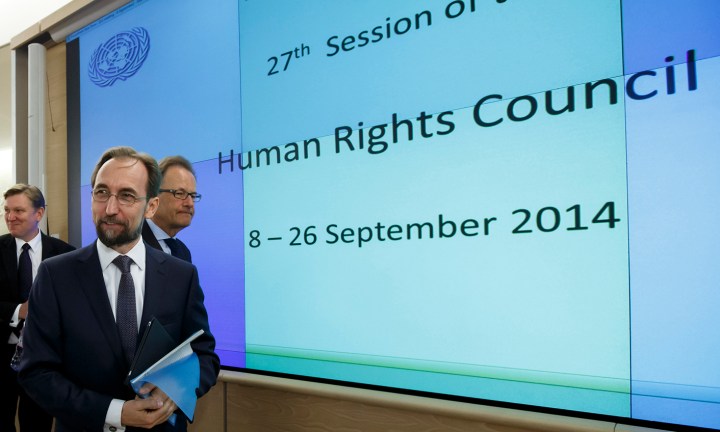World
Op-Ed: South Africa must not separate human rights from LGBTI rights

For once, South Africa did the right thing when it comes to protecting LGBTI rights at the United Nations. It’s not enough, however – that battle is far from over, and South Africa has a crucial role to play. By SHEHNILLA MOHAMED.
South Africa must be applauded for voting in favour of the Resolution on Human Rights, Sexual Orientation and Gender Identity (SOGI) adopted by the 27th Session of the Human Rights Council in Geneva last week.
But while the resolution has been hailed as a significant step forward in the fight against violence and discrimination based on sexual orientation and gender identity, the battle is far from over.
In many parts of the world, and especially Africa, lesbian, gay, bisexual, transgender and intersex (LGBTI) people face hostility, discrimination and danger.
At least 80 countries still criminalise consensual same-sex intimacy and 37 of these are in Africa. In five countries, the death penalty can be imposed.
Even in South Africa, whose democracy was founded on the basis of human dignity, equality and the advancement of human rights, and whose constitution expressly prohibits discrimination based on sexual orientation and gender identity, LGBTI citizens are not safe. Even as the issues were being discussed in Geneva, South African authorities reported the brutal rape and murder of yet another lesbian, Thembelihe ‘Lihle’ Sokela (28). And this is a country that has legal safeguards for this community.
Ambassador Abdul Samad Minty, South Africa’s permanent representative to the United Nations, acknowledged that despite the enabling laws, South Africans are still subjected to discrimination and violence based on their sexual orientation and gender identity. The scale of the violence has led the Justice Department to establish a hate crimes unit to deal with this situation, he said.
Ambassador Minty said South Africa took the lead beginning in 2011 on various U.N. initiatives because of the belief that “no person should fear for their safety or be deprived of their dignity because of their sexual orientation or gender identity.”
Also last month, addressing the U.N. General Assembly in New York, South Africa’s Minister of Social Development, Bathabile Dlamini, encouraged African countries to adhere to the African Union’s Addis Ababa Declaration, which states that sexual and reproductive rights can never be divorced from the pursuit of gender equality and equity.
Again, South Africa must be applauded for its leadership on this issue at the global level. Now, it must work to bring the rest of the continent along.
This won’t be easy, but it must be accomplished if South Africa is to consolidate its legitimacy as a human rights defender and remain true to its history and the principles on which it was founded.
As Minister Dlamini rightly points out, the Addis Ababa Declaration makes a critical connection between rights, development and services by establishing that it is not possible to choose between rights and development as one cannot be achieved without the other.
As the economic powerhouse on the continent, South Africa’s foreign policy challenge over the long-term in Africa is to avoid separating LGBTI rights from human rights and economic advancement. It must be noted that LGBTI rights are not separate or special. They are basic human rights guaranteed to every one of us. In Africa, these rights must be linked to other priorities, such as effective public health policies and efficient business practices.
South Africa must show leadership on the continent, starting with its own situation at home, by ensuring that all alleged attacks on LGBTI persons are fully, independently and fairly investigated and that perpetrators are brought to justice.
We should recognise that many African countries have a love-hate relationship with South Africa. An African diplomat to the United Nations told me earlier this year: “As soon as South Africa brings up the issue of sexual orientation and gender identity rights, many of the Africa Group see South Africa as being mad and refuse to engage.”
But it’s not enough for South African diplomats to try to persuade their African counterparts at the United Nations alone. Progressive African leaders must also engage through the Southern African Development Community (SADC) and the African Union to persuade fellow Africans that excluding and discriminating against LGBTI citizens undermines economic growth and is ‘Un-African,’ especially in light of the continent’s history of oppression on the basis of race.
At an event focused jointly on LGBTI rights and ending extreme poverty in Africa, which was co-organised by the U.S. Agency for International Development and the International Gay and Lesbian Human Rights Commission (IGLHRC), and held on the sidelines of the U.N. General Assembly in New York, Archbishop Desmond Tutu, the Nobel laureate, said: “This is not just a righteous and moral vision. It is pragmatic too. If you manage to lift the most disenfranchised of members out of the clutches of extreme poverty, it makes sense to marshal all available human capital. It makes as little sense to exclude brilliant scientists or architects or teachers from contributing to human development on the basis that they have large noses, as it does to exclude them on the basis that they are gay or lesbian.” DM
Shehnilla Mohamed is Africa Director for the New York Headquartered International Gay and Lesbian Human Rights Commission. She is based in Johannesburg.
Photo: UN High Commissioner for Human Rights Jordan’s Zeid Ra’ad al Hussein (L) and Michael Moller (R) Acting Director General of the United Nations Office in Geneva arrive in the assembly room, prior the 27th session of the Human Rights Council, at the European headquarters of the United Nations in Geneva, Switzerland, 08 September 2014. EPA/SALVATORE DI NOLFI




















 Become an Insider
Become an Insider